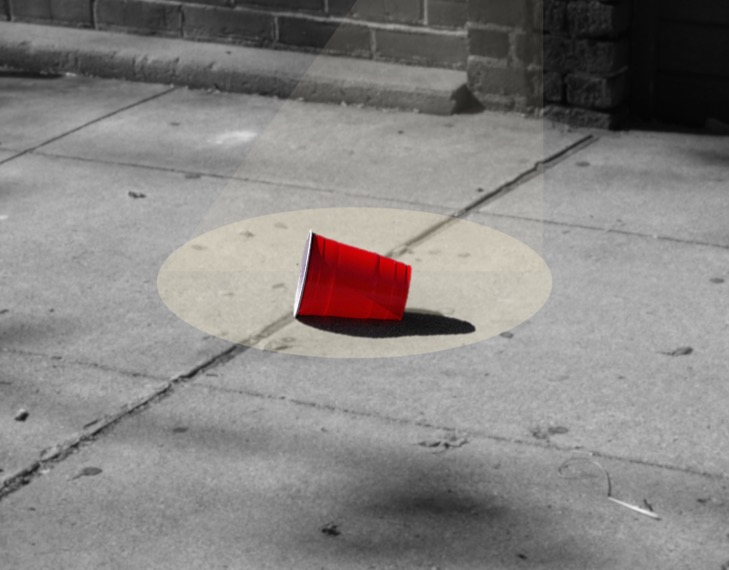Toby Keith was Wrong: Red Solo Cups are worse than you thought
By Luodan Rojas
At nearly 3 a.m., the partygoers of Northwestern University are starting to make their way home. Toby Keith’s “Red Solo Cup” plays in the background and the well-known chorus, “Red Solo Cup, I fill you up. Let’s have a party,” still rings in everyone’s ears. A few hours later, however, the excitement has diminished and dozens of those 12-ounce tumblers remain scattered across the fraternity lawn.
University campuses generate considerable waste, including food, water and energy. But the most visible standout? The red Solo Cup.
Like most universities, Northwestern only recycles plastics numbers one-five, which are signified by the little triangle on the product. These numbers refer to different types of plastic, ranging from milk jugs and detergent bottles to six-pack-rings and yogurt lids.
Since Solo Cups are made of plastic number six, also known as polystyrene or Styrofoam, they are notably difficult-to-recycle. When placed in mixed bins during transportation, polystyrene can be easily contaminated by the dirt or food residue left on other materials.
Styrofoam also releases toxic chemicals during breakdown, the most hazardous of which being styrene, a petroleum byproduct that has been linked to cancer, vision and hearing loss, impaired memory, etc.
“Number six and seven plastics are the ‘catch-all’ categories,” Sophie Brauer, junior and president of Eco-Reps at Northwestern, said. “We’d need to go through a special recycling plant in order to recycle these cups, but Northwestern just hasn’t gotten around to that yet.”
The Eco-Reps are a student-run organization designed to promote sustainability on campus. Most residential colleges/halls and greek houses have an Eco-Rep.
Also excluded from the single-stream recycling are food wrappers and paper towels. Because recycling plants cannot burn the residue and grease off food wrappers and paper towels like they can with metal and plastic, these materials are also excluded from single-stream recycling.
But third party companies like TerraCycle provide programs to collect hard-to-recycle products. TerraCycle, based in Trenton, New Jersey, offers a range of free programs and solutions for almost every form of waste, including binders, cigarettes and Capri Sun drink pouches.
Economics play a big role in determining what a university recycles. “Recycling is economic-based. If the economics aren’t there to recycle it, then it’s not going to happen. It’s all a matter of the value needed to collect and process versus the end value,” Lauren Taylor, global director of communications at TerraCycle explained.
TerraCycle’s Solo Cup recycling program has grown in popularity over the past few years. Participants can ship cups to the company’s headquarters in New Jersey for free, and once collected, they are cleaned, melted into hard plastic and remolded to make new recycled products.
In terms of other reasons for the lack of Solo Cup recycling, some students attribute it to the implications associated with them.
“The issue with recycling materials that are typically linked to alcohol could give the impression that Northwestern, a dry campus, is ‘okaying’ students drinking alcohol,” junior Catherine Mansur from ASG Sustainability Committee said. “When in reality, not allowing the recycling of these materials doesn’t actually stop students from drinking, it just stops them from recycling after they drink.”
Mansur brought up the issue with Julie Cahillane, manager of refuse & recycling at Northwestern. The administration’s response centered around the difficulty with greek life interactions, specifically the fraternities that are worried about getting kicked off campus for alcohol use.
“They [Northwestern] don’t want to be giving any reason to allow students to drink and the fraternities are in a tricky position where even if they did want to recycle, it can sort of threaten their position on campus as well,” Mansur said.
The root of the issue lies not so much in the actual product, the Solo Cups, but more so in what they imply on a college campus.
“The association with alcohol and drinking and the idea that because you’re underage, you’re not supposed to be drinking on campus,” Celestine Emberton, Eco-Rep, said. “The Solo Cups all just end up in the garbage.”
The appearance of Solo Cups on a lawn surrounded by fraternity houses carries the association of drinking which can get a lot of students in trouble, particularly if they are under the legal drinking age of 21.
“I’ve heard that there’s been resistance with the administration because they may think that having an institutionalized Solo Cup recycling program would look like they were condoning underage drinking,” Brauer said.
But this logic does not only apply to Solo Cups.
“Some of the fraternity eco-reps have mentioned to me that even some products that can be recycled through Northwestern systems, beer cans for example, also end up in the trash because it’s easier to hide them than risk getting in trouble,” Brauer said. “So, the result is a lot of easily recyclable stuff being thrown away.”
 Although the majority of Toby Keith’s song is spot-on, one line presents alarming error. Keith sings, “Hey red solo cup is cheap and disposable, in 14 years they are decomposable.”
Although the majority of Toby Keith’s song is spot-on, one line presents alarming error. Keith sings, “Hey red solo cup is cheap and disposable, in 14 years they are decomposable.”
Solo Cups cannot fully decompose in 14 years, in fact, it is closer to 450 years. In order to reduce their harmful impact on the environment, consumers can move towards greener options like those that Red Cup Living, a company created to provide an alternative of usable red cups to the disposable ones, provides.
“We as a society love to purchase things and things are just disposable in general so really the main thing to do is watch your purchasing behavior.” Taylor said, “Are you buying a product to last or are you buying something you’re going to throw away in a year? Purchase from companies that are trying to make a difference with their packaging and products.”

